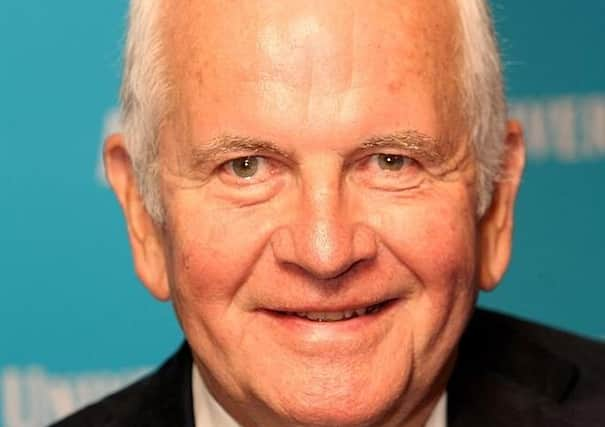Obituary: Sir Ian Holm, brilliant British theatre actor best known for screen roles


Sir Ian Holm was born in a psychiatric hospital, the son of an emotionally distant Scottish doctor who pioneered the idea of treating mental illness by giving patients electric shocks. When Holm told his father he wanted to be an actor, his father responded with the words “Prove it”. Holm did.
Holm was lionised by other actors for his work in the theatre – Olivier once asked him how he did it, and he was reputedly Harold Pinter’s favourite actor. But it came at a cost – a mental breakdown that left him curled up and crying on his dressing room floor before a performance of The Iceman Cometh in 1976. It would be several years before his rather wary return to the theatre.
Advertisement
Hide AdAdvertisement
Hide AdAnd he was in his seventies before he achieved his greatest popular success as Bilbo Baggins in The Lord of the Rings and The Hobbit films. “I get a lot of fan mail addressed to Bilbo and sometimes Sir Bilbo,” he said. “It’s hardly ever addressed to Ian Holm.”
While he returned to the theatre eventually and won an Olivier Award for his Lear at the National Theatre in London in the late 1990s, it was in support roles in movies that Holm reached his widest audience. He won a Bafta and was nominated for an Oscar for his performance as Harold Abrahams’ trainer in Chariots of Fire, he was a sinister android whom no one knows is an android in Alien and he played Polonius in the 1990 film of Hamlet that was shot in Scotland, at Dunnottar and Blackness Castles, with Mel Gibson as the indecisive Dane.
Those of a certain age will have fond memories of Holm in a rare lead screen role as Pod in The Borrowers and The Return of the Borrowers in the early 1990s. He was not tall, 5ft 6in, and despite the demons and what he called “the Iceman crack-up”, he had a jolly, smiley face, characteristics that seemed to make him obvious casting as Frodo and Pod.
Holm had a great passion for life and women. “Ian wasn’t hard to love,” said theatre director Richard Eyre. “He was funny and modest and a constant enthusiast for whatever he was working on.” Holm was forever falling into and out of love. One paper labelled him “The Lord of the Flings”. He had four wives, including actress Penelope Wilton, to whom he was married for most of the 1990s, and five children from his various marriages and relationships.
He was born Ian Holm Cuthbert in 1931 in an old psychiatric hospital in Essex, where his father James Cuthbert was superintendent. His mother Jean was a nurse. He was sent to boarding school at five. He was not academic, but secured a place at RADA, the Royal Academy of Dramatic Art in London. His training was interrupted by National Service in the Army.
He said in one interview that he was a virgin until he was 24, but he married for the first time in 1955, to a theatre wardrobe assistant. By the late 1950s he was making his mark in Stratford-upon-Avon, playing Puck in A Midsummer Night’s Dream and The Fool in Lear. After eight years of marriage and two children he left his first wife for another, teenaged wardrobe assistant, with whom he had another two children without the formality of marriage.
He played Lenny in the original production of Harold Pinter’s The Homecoming in the London West End in 1965 and won a Tony award when he reprised the role on Broadway, before returning to Stratford and a memorable performance as Romeo. On screen he played Richard III in The War of the Roses, a BBC mini-series adapted from Shakespeare’s history plays, and he was the French president Poincare in the film of Oh! What a Lovely War and David Rizzio in Mary, Queen of Scots, with Vanessa Redgrave and Glenda Jackson.
After “the Iceman crack-up”, he turned increasingly to cinema. He quickly built on his reputation as a “character actor” in movies, with a cold characterisation in the original Alien film and a passionate one in Chariots of Fire as Sam Mussabini, the controversial professional trainer at a time when running was very much a gentlemanly, amateur affair.
Advertisement
Hide AdAdvertisement
Hide AdHe went on to appear in support roles in a long list of notable films and TV mini-series, including Time Bandits, as Napoleon – a role he had been meant to play in a Stanley Kubrick epic. He said the Kubrick project seemed to stall, Kubrick stopped returning his calls and he never, ever heard from him again.
Other credits include Greystoke: The Legend of Tarzan, Lord of the Apes; the TV adaptation of Len Deighton’s Game, Set and Match; Kenneth Branagh’s films of Henry V and Frankenstein; The Madness of King George; the romcom Loch Ness and Luc Besson’s sci-fi epic The Fifth Element, before being cast as Bilbo Baggins in The Lord of the Rings: The Fellowship of the Ring.
He was Bilbo in four films in The Lord of the Rings and Hobbit series, effectively crowning a long and varied career with a “welcome slice of celebrity pie”, complete with all that Bilbo fan mail. He had already been knighted, pre-Bilbo, in the 1998 Birthday Honours. He died from complications of Parkinson’s disease and is survived by his fourth wife Sophie de Stempel, an artist, and by his five children.
Brian Pendreigh
Comments
Want to join the conversation? Please or to comment on this article.